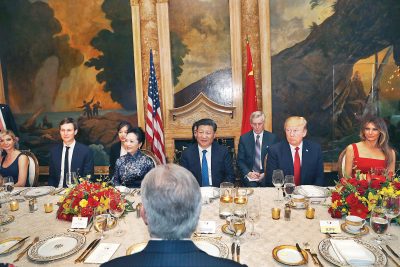US-China Trade War, Negotiations to Resume? Xi and Trump to Meet on Sidelines of G20
Hold the Cheers

Talks broke down in early May over unacceptable US demands. Eleven rounds of talks since China’s Xi Jinping met with Trump at his Mar a Lago, Florida estate in April 2017 failed to resolve major structural issues.
Blacklisting Chinese tech giant Huawei and its 70 affiliates by the Trump regime on the phony pretext of preventing the company from “potentially undermin(ing) US national security” widened the breach between both countries.
So did Trump’s refusal to drop tariffs while talks continue on unresolved issues. Major differences between both sides are more world’s apart now than when negotiations began a year ago.
Beijing stressed it won’t be pressured, bullied, intimidated or threatened to bend to Washington’s will. Agreements are reached when beneficial to all parties.
According to Trump’s trade representative Robert Lighthizer, both countries agreed to resume trade talks. He, Treasury Secretary Mnuchin and China’s Vice Premier and chief negotiator Liu He will meet meet in Osaka, Japan next week, site of the G20 summit, he said.
On Tuesday, Trump said he and Chinese President Xi Jinping will meet on the sidelines of the June 28-29 G20 summit for “an extended meeting,” adding “(o)ur respective teams will begin talks prior to our meeting.”
Talks are expected to cover a range of bilateral differences, an agenda for their meeting not announced by either country so far.
On Tuesday, Trump and Xi spoke by phone. According to China’s Foreign Ministry spokesperson Lu Kang, both leaders will discuss bilateral relations with no further elaboration.
Former Chinese Commerce Ministry Vice Minister Wei Jianguo said Xi will stress Beijing’s core interests, including its sovereign, developmental, and territorial rights even though it’s unlikely a concrete agreement will be reached.
That’s for negotiators on both sides to work out, what’s been unattainable for the past year, nothing likely to change ahead as long as the Trump regime remains hardline.
During their last face-to-face meeting at the November 30-December 1 G20 summit in Buenos Aires, Argentina, Trump and Xi agreed on a 90-day truce to continue discussing major world’s apart differences — no progress made in resolving them from then to now.
Both leaders will likely put a brave face on results of their Osaka talks despite no likely resolution of major bilateral differences on major issues.
On Tuesday, Xi reportedly told Trump he expects talks in Osaka to focus on “fundamental issues” affecting bilateral relations.
The US considers China a “strategic competitor” and major adversary, relations between both countries far from what mutual cooperation is all about.
Resolving major bilateral differences has been unattainable because of Washington’s rage to dominate all other nations, demanding they subordinate their sovereign rights to US interests, what’s clearly unacceptable to Beijing.
Bilateral differences are all about the US wanting to undermine China’s aim to become an economic, industrial, and technological powerhouse, matching or exceeding the US, the trade deficit a minor issue by comparison.
Will Xi/Trump talks in Osaka and resumption of talks between their chief negotiators resolve what’s been unresolvable so far?
China’s Global Times struck a hardline note, saying Beijing “must persist and not fear,” adding:
“China’s fearless attitude of over a month will not be in vain. It has sent a clear signal to Washington: China can never be daunted. If the US imposes unfair conditions on China, it must be prepared for a protracted trade war and bear the consequential losses together with China.”
“China is fighting for the country’s sovereignty (and) development…We should do our own things well and unite like a fortress. Persist in our stance and victory will be our only destination.”
China’s official People’s Daily broadsheet said
“(t)he root cause for the China-US trade war is not China’s high-profile publicity, but the US ambition to elevate the so-called ‘America First’ strategy above international justice,” adding:
“China does not want a trade war, but it is not afraid of one, and it will fight one if necessary.”
Impasse between both nations is highly unlikely to change from Xi/Trump talks in Osaka.
Resolving major bilateral differences between negotiators of both sides depends on the US softening its hardline position.
The jury is very much out on whether it’s coming in the weeks and months ahead.
What seemed likely months earlier is highly uncertain now.
*
Note to readers: please click the share buttons below. Forward this article to your email lists. Crosspost on your blog site, internet forums. etc.
Award-winning author Stephen Lendman lives in Chicago. He can be reached at [email protected]. He is a Research Associate of the Centre for Research on Globalization (CRG)
His new book as editor and contributor is titled “Flashpoint in Ukraine: US Drive for Hegemony Risks WW III.”
http://www.claritypress.com/LendmanIII.html
Visit his blog site at sjlendman.blogspot.com.
Featured image: President Donald Trump and Chinese President Xi Jinping, with their wives, first lady Melania Trump and Chinese first lady Peng Liyuan are seated during a dinner at Mar-a-Lago, Thursday, April 6, 2017, in Palm Beach, Fla. Ivanka Trump, the daughter and assistant to President Donald Trump, and White House senior adviser Jared Kushner are seated at left. (AP Photo/Alex Brandon)

